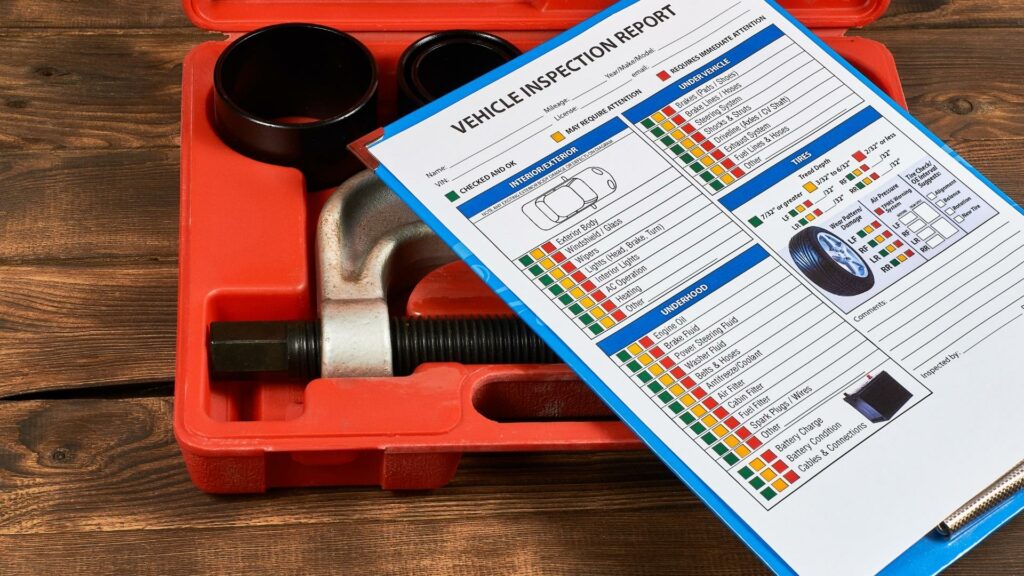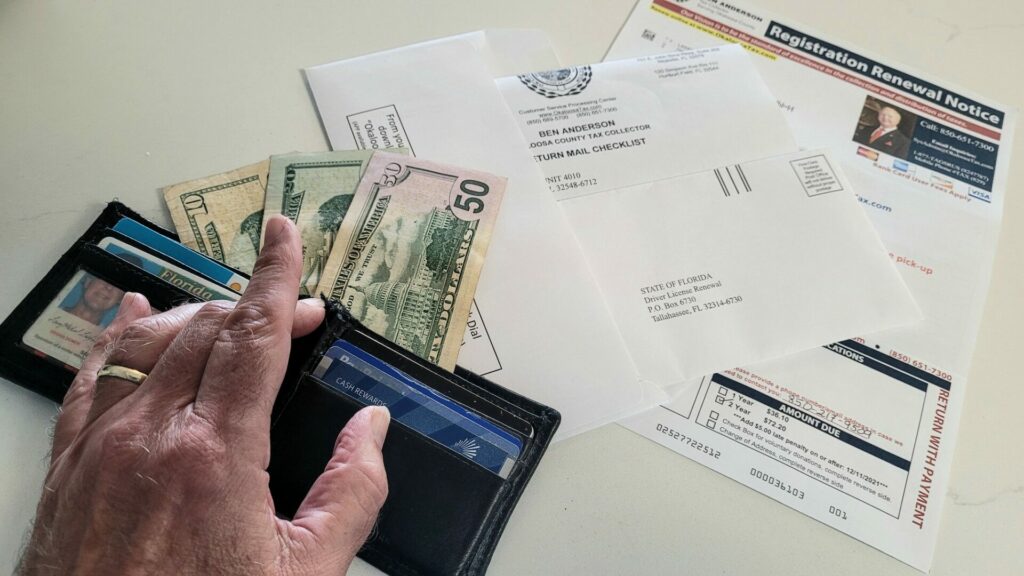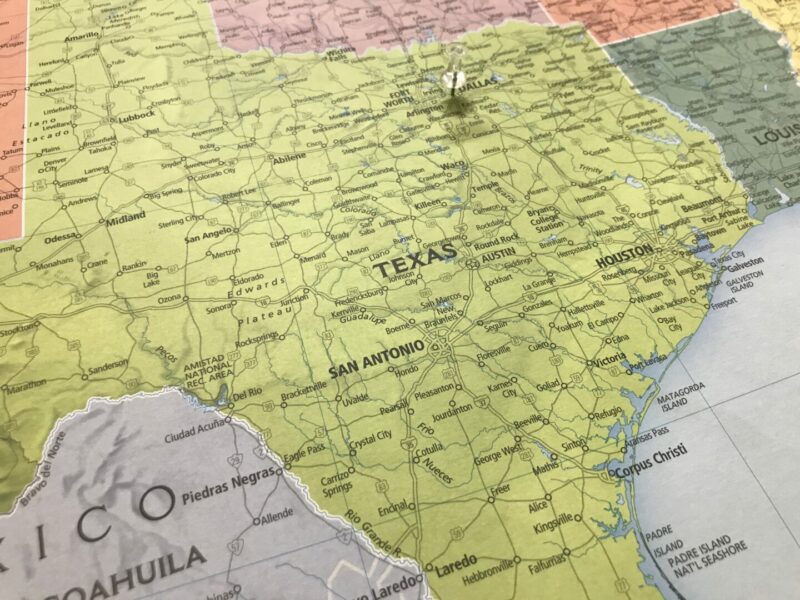Table of Contents Show
Many full-time RVers have to decide which state they’ll use for their domicile when hitting the road. There are many things to consider when making this important decision, but many RVers choose the Lone Star State. If you’re preparing to be a full-time RVer and wondering how to become a Texas resident, this article is for you!
Today, we’re sharing everything you need to know to make establishing your residency in Texas as smooth as possible. Let’s get started!
What Does Claiming Domicile or Residency as an RVer Mean?
Claiming domicile or residency in a state means you’re a legal resident of that state. This will be the state where you register your vehicles, vote, and pay taxes. States like South Dakota, Florida, and Texas are among the most popular states for RVers looking to domicile.
These states typically have the lowest taxes, decent health and vehicle insurance premiums, and friendly education systems for home school families.
Some RVers become residents of a state and then never return. However, some states require you to prove that you’ve spent a certain amount of time there to establish residency or renew licenses and vehicle registrations.
So make sure that you do your research and know what the state expects of you.
Pros of Becoming a Texas Resident
As we stated, Texas is one of the most popular options for RVers – for a good reason. Texas is one of the nine states in the United States that doesn’t have a state income tax.
You’ll still need to pay your federal income taxes, but those moving their residency from California (13.3%), New Jersey (10.75%), or Oregon (9.9%) can easily save thousands of dollars each year.
Another benefit of becoming a Texas resident is that you can do vehicle and license renewals online. There’s a good chance that you won’t have to return to the Lone Star state for years.
However, Texas is a beautiful state full of adventures, so you likely want to revisit it.

Cons of Becoming a Texas Resident
While becoming a Texas resident is a good option for many, there are a few things to consider. Insurance rates in Texas can be rather high, especially for big beefy trucks that are great for towing RVs across the country.
One negative that catches many off guard is that you might need a special license to tow your RV. If your vehicle and RV’s combined weight is more than 26,000 lbs, you’ll need a special Class B license.
This is another reason you should take your rig across a scale and know your weight.

How Do I Change My Residency to Texas?
Establishing your residency requires several specific steps. Some of these must be done in a certain order to make the process as smooth as possible.
Let’s look at what you need to do to become a Texas Resident and when you should do it!
Establish Residency
The first thing that you need to do is to establish an address. We use Texas Home Base to lease our address, but many choose to use Escapees or other services. You’ll typically pay an annual fee, but this typically can allow you to also sign up for mail services.
Some will sort and scan your mail for you and allow you to view received mail online. This helps ensure you never miss an important piece of mail while traveling.
When selecting a mail service company while becoming a Texas resident, make sure you compare each service’s benefits.
Update Your Records
Now that you have a Texas address, you can start switching over your mail. You’ll want to use this address for bills or anything you don’t want to miss while on the road.
You can even have your magazine subscriptions sent to your mailbox, and you’ll receive them when you request your mail.
Switch to a Texas Insurance Company
After updating your address and records, you’ll want to make sure you establish a Texas insurance policy. Depending on where you’re moving from, it may or may not be cheaper than your previous rate.
You’ll need to show proof of your Texas insurance policy when registering your vehicle with the county. So make sure you don’t skip this step!
Get Your RV and Other Vehicles Inspected
Texas does require a vehicle safety inspection on all vehicles, including your RVs. This is a relatively painless process if your vehicle is in good working order and free of any defects.
It’s a good idea to check the inspection criteria before heading to inspection and fix any issues that would prohibit you from passing.

Apply for a Drivers License
Now it’s time to apply for a driver’s license so you can legally drive when you become a Texas resident. Texas has a requirement that anyone applying for a license show proof that they have lived in Texas for at least 30 days. However, they waive this requirement for anyone with a valid, unexpired driver’s license from another state. So make sure your license is valid and not expired, or you’ll need to stay for 30 days!
You’ll need to apply for your driver’s license at any Department of Public Safety offices in Texas within 90 days of establishing your Texas residency. Bring your previous driver’s license, complete the application, and show proof of vehicle registration. You’ll also need to show one primary identity document like a birth certificate or a combination of a social security card, W-2, and your current unexpired driver’s license from another state. The last form you’ll fill out will be an affidavit of domicile, which will need to be notarized.
Keep in Mind: If you’re changing domicile to become a full-time RVer, you might also need new health insurance. Be sure to read How We Found the Best Health Insurance As Full-Time RVers next!
Register Your Vehicles
Visit the county tax office to register your vehicles. Make sure you bring your proof of car insurance and the proof of a passing vehicle safety inspection.
If you need to register your RV and it’s not in the state of Texas, you can self-certify it. You don’t need to bring it to the clerk’s office.
Present the title for your vehicles or complete a Texas Certificate of Title, Application for Registration Purposes Only, and show proof of current registration.
RV owners will also need to bring proof of weight and a photograph of the exterior of their vehicle. This is easily the most difficult step in the process. However, Escapees and other services are very familiar with the entire process. They have a tremendous amount of resources to help walk you through it.
The local clerk’s offices are also very experienced with the process and can be a wealth of assistance.

Register to Vote
One of the easiest steps during this process is registering to vote. The best way to make this happen is when you are obtaining your driver’s license.
They’ll typically ask you if you want to register to vote during the process. You need to tell them you want to, and they’ll set it up in their system.
Keep in Mind: Not everyone loves the RV lifestyle. Read 13 of the Worst Things About Full-Time RV Living before taking the leap!
How Long Does It Take to Become a Resident of Texas?
If you stay on top of things and are organized, you can easily transition everything over to become a Texas resident in a single day.
You may even be able to start the process by completing forms and mailing documents ahead before you even enter the state.
Again, using services like Escapees and other popular services can make the process practically painless.

Can I Be a Resident of Two States?
Despite being different terms, residency and domicile often get confused. You can only have one domicile. This is your legal connection to the state and the place you intend to return to.
However, you can find yourself in tax issues if you can’t prove that you aren’t a resident of another state.
If you own property in another state, spend a majority of the year there, and have significant legal connections, a state could classify you as a resident when it comes to taxes.
Save yourself the legal trouble and make sure you are fully aware of the requirements in whatever state you choose!
Becoming a Texas Resident Is a Good Option for RVers
Establishing residency in Texas is a great option for many RVers. The state offers some incredible benefits for the RV lifestyle and makes it easy to enjoy your time traveling.
Not having to worry about paying state income taxes or returning to the state are just a few reasons we think you should consider Texas for your domicile if you’re hitting the road.
Have you ever had to become a Texas resident as a full-time RVer?






